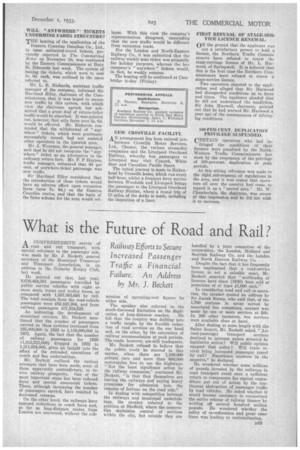What is the Future of Road and Rail?
Page 67

If you've noticed an error in this article please click here to report it so we can fix it.
ACOMPREHENSIVE survey of road and rail transport, with special reference to the passenger side, was made by Mr. J. Beckett, general secretary of the Municipal Tramways and Transport Association, in an address to the Grimsby Rotary Club, last week.
He pointed out that, last year, 9,636,464,591 passengers travelled by public service vehicles with eight or more seats, trams and trolley buses, as compared with 1,557,003,648 by rail. The total receipts from the road-vehicle passengers were £82,447.364, and from railway passengers £57,324,529.
As indicating the development of municipal services, Mr. Beckett mentioned that the number of passengers carried on these systems increased from 195,000,000 in 1925 to 1,138,000,000 in 1932. Again, the fact that the number of railway passengers for 1920 (1,813,523,000) dropped in 1932 to 1.211,924,000, gives an insight into the effect of the extended operations of coach and bus undertakings.
Mr. Beckett outlined the various attempts that have been made, some of them apparently contradictory, to revive railway prosperity. One of the most important steps has been reduced fares and special concession tickets. These, although increasing the number of passengers carried, have resulted in decreased revenue.
On the other hand, the railways have opposed reductions in coach fares and, so far as long-distance routes from London are concerned, without the sub mission of operating-cost figures by either side.
The speaker also referred to the much-discussed limitation on the dupli cation of long-distance coaches. He felt that the country was drifting into a traffic tangle, by the forcible reduction of road services on the one hand and, on the other, by the saturation of railway accommodation at peak periods. The roads, however, are still inadequate.
Mr. Beckett refused to believe that the public could be coerced in this matter, when there are 1,100,000 private cars and more than 600,000 motorcycles free to use the highways. "Not the least significant action by the railway companies," continued Mr. Beckett, "is that they themselves are leaving the railways and paying heavy premiums for admission into the temples of fortune on the road side."
In dealing with competition between the railways and municipal undertakings, the speaker referred to the position at Sheffield, where the corporation maintains control of services within the city, but outside they are
handled by a joint committee of the 'corporation, the London, Midland and Scottish Railway Co. and the London and North Eastern Railway Co.
Despite the fact that it has frequently been emphasized that it road-service licence is not a saleable asset, Mr. Beckett asserted that "multitudes of licences have since (1930) been sold at premiums of at least £1,000 each."
En considering road and rail co-operation, the speaker quoted an address by Sir Josiah Stamp, who said that, of the 1,760 stations in areas served by associated bus companies, contact was made by one or more services at 560. In 309 other instances, bus services were available close at hand.
After dealing at some length with the Salter Report, Mr. Beckett asked, "Are road-passenger transport services destined to increase unless arrested by legislative action? Will public opinion support that policy? Will trade revival bring increased passenger travel by rail? Experience answers in the negative," he declared.
He wondered whether some millions of pounds invested by the railways in road transport could earn a sufficient return to compensate for capital expenditure put out of action by the continuous abstraction of passenger traffic by road vehicles. He asked whether it would become necessary to reconstruct the entire scheme of railway finance by writing off several hundred million pounds. He wondered whether the policy of co-ordination and great combines was leading to nationalization.




































































































